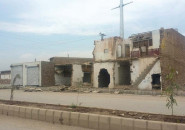Pollen allergy cases surge in Abbottabad
White pollen from Poplar trees triggers allergic reactions
1646631798-0/download-(1)1646631798-0-640x480.webp)
A sharp rise in pollen allergy cases has been reported across Abbottabad, with Poplar trees identified as the primary cause. The cotton-like white pollen released by these trees is triggering widespread allergic reactions, especially in areas like Link Road, Supply, Mandian, and Sir Syed Colony.
Hospitals, including the District Headquarters (DHQ) Hospital, are receiving 12 to 15 allergy patients daily, while figures are believed to be even higher at Ayub Teaching Hospital. Common symptoms include sneezing, itching, throat irritation, and breathing difficulties, particularly among individuals with asthma.
Dr Sabir Rehman, Program Manager of the Provincial TB Control Program Khyber-Pakhtunkhwa, said in response to increasing public complaints over recent years, nearly 50% of Poplar trees in public spaces across Abbottabad have been removed with support from the district administration.
"Despite these efforts, a substantial number of Poplar trees remain on privately-owned properties," he said. "If private landowners collaborate with the health department and district authorities, we can effectively control this allergy crisis."
Dr Rehman emphasized that community engagement and public awareness are crucial in mitigating seasonal allergies.
He suggested that trimming Poplar trees before spring could significantly reduce pollen releaseoffering a sustainable alternative to large-scale tree removal.
He also urged residents to report high-pollen areas to local health officials so preventive measures can be taken in a timely manner. In the meantime, health teams are closely monitoring allergy trends and coordinating with hospitals to manage the rising number of cases.
Recent heavy rainfall in Abbottabad provided temporary relief by settling airborne pollen and clearing the atmosphere.
Environmental experts have also advised against cutting down Poplar trees entirely, citing their environmental value, and instead recommend regular trimming before the pollen season. Health professionals advise residents to stay indoors during peak pollen hours and use face masks and air purifiers to reduce exposure.
Authorities are being urged to raise public awareness and adopt allergy-sensitive urban planning to prevent future outbreaks.




















COMMENTS
Comments are moderated and generally will be posted if they are on-topic and not abusive.
For more information, please see our Comments FAQ